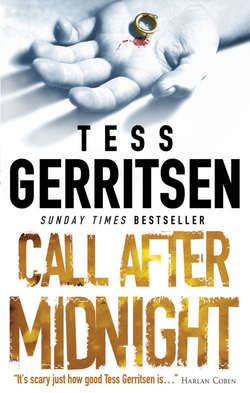Читать книгу Call After Midnight - Тесс Герритсен, Tess Gerritsen - Страница 11
CHAPTER FOUR
Оглавление“YOU’VE HAD IT, O’Hara!” Charles Ambrose stood outside the closed door of his office and looked pointedly at his watch. “And you’re twenty minutes late!”
Unperturbed, Nick hung up his coat and said, “Sorry. I couldn’t help it. The rain had us backed up for—”
“Do you know who just happens to be waiting in my office right now? I mean, do you have any idea?”
“No. Who?”
“Some son of a—” Ambrose abruptly lowered his voice. “The CIA, that’s who! A guy named Van Dam. This morning he calls me up wanting to know about the Fontaine case. What’s the Fontaine case, I ask. He had to tell me what’s going on in my own department! For God’s sake, O’Hara! What the hell do you think you’re doing?”
Nick gazed back calmly. “My job, as a matter of fact.”
“Your job was to tell the widow you were sorry and to fly the damned body back. That was it, period. Instead, Van Dam tells me you’ve been out playing James Bond with Sarah Fontaine.”
“I’ll admit that I went to the funeral. And I did drive Mrs. Fontaine home. I wouldn’t call that playing James Bond.”
In reply, Ambrose turned and flung the office door open. “Get in there, O’Hara!”
Without blinking, Nick walked into the office. The blinds were open and the last drab light of day fell on the shoulders of a man sitting at Ambrose’s desk. He was in his midforties, tall, silent, and like the day outside, totally without color. His hands were folded in a gesture of prayer. There was no sign of Tim Greenstein. Ambrose closed the door, stalked past Nick and seated himself off to the side. The fact that Ambrose had been evicted from his own desk spoke volumes about his usurper’s prestige. This guy, thought Nick, must be hot stuff in the CIA.
“Please sit down, Mr. O’Hara,” said the man. “I’m Jonathan Van Dam.” That was the only label he gave himself: a name.
Nick took a chair, but obedience had nothing to do with it. He was simply not going to stand at attention while he was put through the wringer.
For a moment Van Dam silently regarded him with those colorless eyes. Then he picked up a manila folder. It was Nick’s employment record. “I hope you’re not nervous. It’s just a minor thing, really.” Van Dam glanced through the folder. “Let’s see. You’ve been with state for eight years.”
“Eight years, two months.”
“Two years in Honduras, two in Cairo and four years in London. All in the consular service. A good record, with the exception of two adverse personnel memos. It says here that in Honduras you were too—er, sympathetic to native concerns.”
“That’s because our policy there stinks.”
Van Dam smiled. “Believe me, you’re not the first person to say that.”
The smile threw Nick off guard. He glanced suspiciously at Ambrose, who’d obviously been hoping for an execution and now looked sorely disappointed.
Van Dam sat back. “Mr. O’Hara, this is a country of diverse opinions. I respect men who think for themselves, men like you. Unfortunately, independent thinking is often discouraged in government service. Is that what led to this second memo?”
“I assume it’s about that incident in London.”
“Yes. Could you elaborate?”
“I’m sure Roy Potter filed a report with your office. His version of the story, anyway.”
“Tell me yours.”
Nick sat back, the memory of the incident at once reawakening his anger. “It happened the week our consular chief, Dan Lieberman, was out of town. I was filling in for him. A man named Vladimir Sokolov approached me one night, in confidence. He was an attaché with the Russian embassy in London. Oh, I’d met him before, you know, at the usual round of receptions. He’d always struck me as a little nervous. Worried. Well, he took me aside at one of their—I don’t know, I guess it was a reception for the ambassador. He wanted to talk asylum. He had information to trade—good information, to my mind. I immediately brought the matter to Roy Potter.” Nick glanced at Ambrose. “Potter was chief of intelligence in our London mission.” He looked back at Van Dam. “Anyway, Potter was skeptical. He wanted to try using Sokolov as a double agent first. Maybe get some hard intelligence from the Soviets. I tried to convince him the man was in real danger. And he had a family in London, a wife and two kids. But Potter decided to wait before taking him in.”
“I can see his point. Sokolov had strong links to the KGB. I would’ve questioned his motives, too.”
“Yeah? If he was a KGB plant, why did his kids find him dead a few days later? Even the Soviets don’t dispose of their own operatives without good reason. Your people left him to the wolves.”
